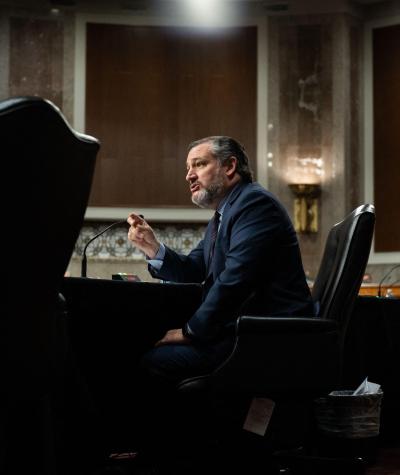The U.S. Supreme Court has recognized that the risk of corruption is “inherent” in a campaign finance system that relies on private contributions to candidates. One type of contribution that raises particularly acute corruption concerns is money raised after Election Day to repay candidates’ personal loans to their campaigns.
Using post-election contributions to repay a candidate’s personal loans effectively allows private parties and special interests to send funds into a candidate’s pocket after the campaign has come to an end.
On Jan. 19, 2022, the Supreme Court will hear argument in Federal Election Commission (FEC) v. Ted Cruz for Senate, a case that threatens to supercharge this potentially corruption-prone practice.
Cruz involves a provision of the Bipartisan Campaign Reform Act (BCRA) that limits the amount of personal campaign loans that federal candidates can repay using money raised after Election Day. This provision (“the limit”) places a $250,000 cap on the use of post-election funds to retire loans made by candidates.
Shortly before the 2018 election, Sen. Ted Cruz loaned his reelection campaign $260,000. He has since admitted that he made the loan to engineer a lawsuit challenging the limit. The lawsuit was filed in the U.S. District Court for the District of Columbia in April 2019.
Cruz argued that the limit violates the First Amendment by unconstitutionally burdening political speech, highlighting past decisions holding that the First Amendment prohibits restrictions on the amounts candidates can spend to finance their own campaigns.
In June 2021, a three-judge district court agreed with Cruz and held that the limit is unconstitutional — although it conceded the law did not directly restrict how much candidates could give or loan their campaigns. Invoking a special provision of BCRA, the government appealed the case directly to the Supreme Court
Campaign Legal Center (CLC) has filed two briefs — the second in partnership with Citizens for Responsibility and Ethics in Washington, Common Cause and Democracy 21 — explaining why the justices should reverse the district court’s decision and uphold the limit’s constitutionality.
As CLC’s briefs establish, the limit imposes no ceiling on candidate campaign spending or speech but serves a critical anti-corruption purpose.
The Limit Imposes No Burden on Campaign Speech
The limit does not restrict how much candidates can spend on their own campaigns or how much individuals can contribute to candidates.
Instead, the limit places a sensible restriction on when candidates can solicit funds to repay personal loans: they must do so before Election Day — and thus before potentially becoming incoming officeholders. Any First Amendment burdens this restriction imposes are negligible, because funds received after Election Day necessarily cannot fund the candidate’s political messaging in that election.
Because it does not restrict political speech and instead regulates funds that eventually go into a candidate’s bank account, the limit operates in essence as a restriction on gifts that a candidate can accept after Election Day. Gift restrictions with caps far below $250,000 are common at the state and federal levels and have never raised serious constitutional doubt.
Unsurprisingly, then, empirical evidence shows that the limit has little real-world effect on candidates’ lending. The limit affects only candidates who loan their campaigns $250,000 or more, but such candidates are very much the exception.
Even considering only those candidates who chose to loan their campaigns money, just 11.4% of loans by House candidates reached the $250,000 threshold. For candidates who lend less than this threshold, the limit is irrelevant.
The rarity of $250,000-plus loans by candidates likely reflects the fact that a far stronger deterrent of significant lending than the limit is the notorious difficulty of post-election fundraising.
This difficulty means that the limit imposes effectively no burden in most cases. Most candidates choose not to lend their campaigns $250,000 because they likely fear they could not raise enough to reimburse themselves.
The candidates who do lend that much usually find that they cannot raise anywhere near $250,000, as would be necessary to bring the limit into play.
The Limit Plays a Vital Role in Preventing Actual and Apparent Corruption
Any minimal burden generated by the limit is justified by the important anti-corruption purposes it serves — the same purposes that underlie restrictions on gifts to officeholders in place across all levels of government.
CLC’s briefs described the wealth of evidence that substantiates these corruption concerns.
First, researchers have found that winning campaigns — which lobbyists target with post-election contributions — are far more successful at repaying candidates’ personal loans than are losing campaigns.
Second, congressional fundraising and voting data show that candidates with outstanding personal campaign loans are significantly more responsive to post-election contributions from special interests.
Critically, that effect disappeared for members of Congress with loans over $250,000 after the limit became law. Not only is there a demonstrable corruption risk at play, but the limit was objectively successful in remedying it.
Third, post-election debt repayment by state and local politicians — whose campaigns are not covered by the limit — has frequently generated corruption concerns at those levels of government.
All this evidence has led both the media and Democratic and Republican lawmakers to criticize post-election fundraising and loan repayment — and to demand state-level reforms like the limit. Senate Minority Leader Mitch McConnell himself put it best when he referred to post-election fundraising to retire personal loans as an “unethical practice of shaking down special interests.”
Ultimately, the statute challenged in Cruz is a matter of common sense: the corruption risk inherent in post-election payments effectively made to candidates themselves is obvious and acute. In crafting the limit, Congress addressed this risk without unduly burdening speech. The Supreme Court should uphold Congress’ work.
